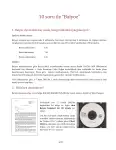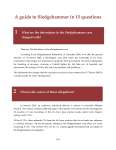In what can only be called a bizarre piece, Abdulhamit Bilici takes aim at Dani in Today’s Zaman, the English language edition of Zaman. The article is titled “What Will Harvard Tell Rodrik?” Mr. Bilici doesn’t say why he thinks “Harvard” should tell Rodrik anything at all – but he obviously would like to see somebody slap Rodrik on the wrist. Clearly, he has no idea about academic freedom and how universities in the U.S. operate.
Zaman is the media flagship of the Fethullan Gülen movement. It has consistently spread disinformation about the Sledgehammer case — and there plenty examples of it here as well. But what’s particularly troubling about Bilici’s article are the questions it raises about what the Gülen movement is up to in Turkey.
First the lies. Hold on tight, because there is lots of it.
“In spite of the reports issued by the Scientific and Technological Research Council of Turkey (TÜBİTAK) …”
Wrong. TUBITAK never authenticated the CDs in question. It only certified that the dates in the metadata were from 2003 — information which, as the TUBITAK itself recognized in a subsequent report, could have been easily altered if so desired.
“and the military prosecutor’s office, …”
Wrong. The military prosecutor’s office never authenticated the coup plans either. A detailed military examination concluded that the CDs were fabricated and the coup plans were fictional.
“the scandalous voice recordings which even Çetin Doğan cannot deny,…”
Çetin Doğan doesn’t deny the recordings, which were made under his orders in any case, because they are from a military contingency planning exercise and contain nothing that could be construed as criminal or pertaining to a coup.
“… phone calls, …”
Wrong. There is no evidence from phone calls that relates to any coup plans.
“… the confessions by dozens of public servants who participated in the preparation of the documents,”
Wrong. There is not a single confession in the case. There were two – not dozens, just two – civilian secretaries charged with preparing documents at the headquarters of the 1st Army at the time, and both have explicitly denied any knowledge of the Sledgehammer plan or having participated in its preparation. None of the 195 defendants (or anyone else) has confessed to any of the criminal activities attributed to them. There is not a single eyewitness that has come forward with knowledge about Sledgehammer or associated activities.
“this professor from Harvard and his wife tried to hide the gigantic iceberg based on the fact that some institutions that did not exist in 2003 when the said meeting was held were referred to in the documents.”
Not so fast. The evidence in this case consists of three CDs said to have been prepared in 2003, containing detailed coup plans. What we have shown – and nobody has been able to deny — is that these CDs contain dozens of references to entities– companies, NGOs, hospitals, military units – that didn’t exist at the time. These anachronisms demonstrate, with no room for doubt, that the CDs in question were produced not in 2003, but in the second half of 2009 at the earliest. In other words, these are fake CDs that have been tampered with.
“the files [recently found in the Gölcük Naval Command] basically disprove the theory that he has called his most certain academic finding to date …”
Wrong. These files have all the same problems that the previous ones did – plus some additional ones!
“We now understand that the coup plans were updated in 2008 and this information explains how it is that some of the names of institutions that did not exist in 2003 showed up on some of the Sledgehammer CDs.”
Wrong. There was in fact no “updating.” The police officers mistakenly reported a single one among the thousands of the documents in question as having been last saved in 2008. This turns out to have been a typo, as is evident from other police reports on the same file and as becomes clear from an examination of the actual metadata of the file in question (which shows a date from 2003).
“More important is the statement revealed in the document, which indicates what commanders would be retired following the coup: “If we are caught, we’re going to call it a war game.”
This is of course one of the fabricated documents (which, along with all the others in the case, is an unsigned, digital document, full of inconsistencies with military usage and procedures).
“a coup attempt which even a US ambassador has confirmed, according to Wiki Leaks documents”
Wrong. In Wikileaks documents, not only does Ambassador Jeffries not confirm any coup, he in fact makes clear his view that the case is being manipulated by the AKP government for political gain.
Now, all this raises a number of obvious questions: Why are Mr. Bilici, Zaman, and by implication, the Gülen movement so intent on saving this case? Why do they spend so much effort to deny the obvious inconsistencies and patent evidence of fabrication? Why do they work so hard to spread patent untruths about the case?
And if they are truly inspired by democratic ideals and respect for the rule of law and human rights, why are they acting in ways that run so counter to these ideals?








22 Ocak 2011 20:05
I wonder which Wikileaks document we should be looking at? Here’s one that might be related: http://wikileaks.ch/cable/2010/02/10ANKARA294.html
26 Ocak 2011 01:22
“…I wonder which Wikileaks document we should be looking at?…” The one that reveals the gossip of prime minister’s buying 8 bar of chocolate while visiting Switzerland. Surely a pure gossip nothing else. The truth is he’d bought 5 bars not 8.